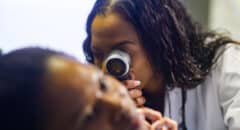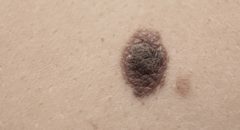 (BlackDoctor.org) — The deadly skin cancer, melanoma, has risen over the last few decades. Early screening and detection was thought to be helpful but it does not matter, according to a new study.
(BlackDoctor.org) — The deadly skin cancer, melanoma, has risen over the last few decades. Early screening and detection was thought to be helpful but it does not matter, according to a new study.
For years, experts have debated whether the dramatic rise in melanoma — one of the fastest growing cancers worldwide — is a true increase or just a reflection of better and expanded screening, with doctors simply finding more cases and at earlier stages.
In the new study, researchers looked at people in lower socioeconomic classes who typically don’t have ideal access to health care and also took into account factors such as the severity or thickness of the melanoma tumors at diagnosis.
Increases in melanomas occurred for tumors of all thicknesses, and the incidence doubled in all socioeconomic groups over a 10-year period studied.
The conclusion? “The rise in the melanoma rates is at least partly due to a real increase,” says study researcher Eleni Linos, MD, DrPH, a dermatology resident at Stanford University in California. The study was published online in the Journal of Investigative Dermatology.
About 62,000 new cases of melanoma were diagnosed in the U.S. in 2008, according to the American Cancer Society, and about 8,000 people died of it in 2008. The tumors are usually brown or black and often appear on the face, neck, trunk, and legs.
Melanoma Thickness
Linos and her colleagues analyzed more than 70,000 new cases of malignant melanoma diagnosed from 1992 to 2004, drawing data from a national program known as the Surveillance Epidemiology and End Results (SEER). They also looked at a smaller subset of nearly 30,000 cases from California, where information on the patients’ socioeconomic status was available.
They looked, too, at how thick the tumor was at diagnosis. “If you have a very thin tumor when diagnosed, you have a good prognosis,” says Myles Cockburn, PhD, associate professor of preventive medicine at the University of Southern California Keck School of Medicine and a study researcher. A tumor that is thick at diagnosis — greater than 4 millimeters — has a much bleaker prognosis, he states.
Overall, the incidence of melanoma increased by 3.1% per year, the research team found. The increases occurred for tumors of all thicknesses, including those over 4 millimeters.
The biggest increase, Linos says, was found in men over age 65. Both the incidence of melanoma and the death rates are going up in that group.
“Melanoma rates are going up, especially in men over 65 years of age, where they exceed 125 new cases per 100,000 people,” she says. “Melanoma rates are going up across all socioeconomic groups and regardless of tumor thickness.”
Linos stops short of calling it an epidemic, saying that it is a “true rise” in incidence.
Melanoma Study: Second Opinion
While the new findings probably won’t lay to rest the debate in the scientific community about whether the rise in melanoma cases is a true epidemic, the findings do show a true rise in melanoma, agrees Steven Wang, MD, director of dermatologic surgery and dermatology at Memorial Sloan-Kettering Cancer Center and a member of The Skin Cancer Foundation’s Photobiology Committee.
“There is no debate about the rising incidence of melanoma,” he says. “We should turn this around and focus on the more important questions.” Those include finding better treatments for advanced melanoma, he states. Finding tumors earlier is a good thing, he adds. “It can avoid [the need for] aggressive surgery, for instance.”
“They showed the thicker tumors, which are much less likely to be incorrectly diagnosed as melanoma, increased as well,” says Martin A. Weinstock, MD, PhD, professor of dermatology and community health at Brown University and chairman of the American Cancer Society Skin Cancer Advisory Committee. “That is probably the single most important observation they made, because it does suggest that indeed the increase in incidence is real as opposed to an artifact of early detection activity.’
The emphasis, agrees Cockburn, should shift from the current debate. What’s important is finding out why the incidence isn’t declining and emphasizing the need to get screened. “Screening is really important,” he says “You should ask your doctor for a skin exam.”
The Skin Cancer Foundation recommends that everyone perform a self-exam once a month, consulting a dermatologist if they find worrisome symptoms, and get a skin exam from a dermatologist yearly.
Limiting sunlight exposure, wearing sunscreen, and wearing protective clothing including a hat are recommended by the American Cancer Society.









